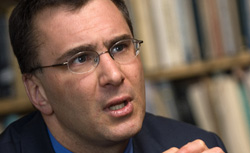Jonathan Gruber, Professor of Economics, MIT
The economics professor who is shaping health care reform at the national and state level.

If health care reform is a major issue in the 2012 presidential campaign, which seems likely, and if President Obama's opponent is former Massachusetts Gov. Mitt Romney, who currently leads in polls of Republican voters, then a central figure of debate will be a silver-tongued economist at MIT. Jonathan Gruber advised both the governor and the president on health care, and even though Romney now derides Obama's law as "disastrous," Gruber's ideas animate both efforts.
Gruber says both proposals stand on a "three-legged stool": preventing insurance companies from denying coverage for pre-existing conditions, requiring universal coverage to eliminate "free riding," and subsidizing insurance plans to make them affordable to all. This "incremental universalism," fixing the existing system instead of starting from scratch, appeals to Republicans for its private-sector involvement and to Democrats for its universal coverage. That's what made both "Romneycare" and "Obamacare" possible.
Gruber first became interested in health care reform as a graduate student in economics at Harvard, when the issue gained prominence under President Clinton. Gruber decided to remain in academia, but Washington's potential ability to implement the changes he was proposing in research paper after research paper continued to interest him. So he brought the two together: He created the Gruber Micro-Simulation Model, which—well, let's use Gruber's words: It "takes two sets of inputs, fixed information on individuals and varying information on policy parameters, to predict the effect of health market interventions on the movement of people and dollars within the U.S. healthcare system." For the first time, policy makers were able to see whether they could actually afford their health-reform bills and what impact they would have on the behavior of both employers and individuals.
The model had an enormous impact on Massachusetts and on the United States, earning Gruber the American Society of Health Economists Inaugural Medal for the best health economist in the nation aged 40 and under in 2006, frequent appearances on MSNBC and a contract to write a comic book explaining how health care reform works. (Here are a few pages from this work in progress, along with a Q&A.)
But, Gruber emphasizes, the federal reform is more ambitious and less affordable than the state law was. We've successfully addressed the coverage side of health care, he says. Now, it's time to take a look at the price tag: Do people choose the most cost-effective health care plan? What factors drive their choices? How can we help them choose the best plan? What's the best way to compensate medical providers: paying them for each service or paying them a fixed amount? And what will happen to our health if we pay them less? Ultimately, we need to find a way to slow down the exponential growth of health care costs.
And so, while continuing to help the federal government implement the law, Gruber is back at his MIT desk to once again synthesize vast amounts of complex academic research in a way that is understandable to the rest of us.
Check out the rest of our government Top Right:
David Bossie, chairman and president, Citizens United
Gen. James Mattis, USMC
Janette Sadik-Khan, New York City transportation commissioner
Michael Crow, president, Arizona State University
